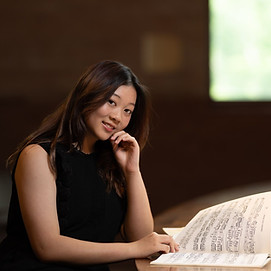top of page

Amber Chow
First prize winner in Ages 15-18 division
Winning composition: Wild Sky
How old were you when you started composing?
I started composing at 15, but I was previously trained in classical music!
What do you love most about composing music?
I love the creative freedom that comes from composing music. Music expresses what words cannot, and sometimes there are phenomena that cannot be described with our language alone. When I cannot express what I need to say in words, I can express it in music. It's especially powerful since the music I write can resonate with other people and maybe they can even derive their own meaning from it.
Tell us a little about how the poetry influenced your IYWCC composition.
Wild Sky by Christy Ann Martine is one of the most beautiful poems I've ever read. Not only does it describe nature, it also conveys the sense of wonder that comes with it. It makes me feel free, but it also reminds me of the sad reality that humanity is losing their connection to the earth. I tried to capture the feeling of freedom through my almost improvisatory piano interludes, while still maintaining a feeling of depth through the shifting tonalities. I hope this piece evokes a love and awe for nature in the listeners, and inspires them to reconnect to the earth.
What was your process/approach to composing your piece for IYWCC?
Composing this piece was a challenge as I've never written for vocals before. I had to learn all the notation quirks of vocal music such as separating the beams and placing phrase markings. After that, I followed the structure of the poem and determined where the emphasis words and climax was. From there, I started building the harmonies, and the motifs. The lyrics of the poem guided what harmonies were underneath and the duration of the notes. For example, the diction of "lost" at the beginning was supported by winding notes in the piano that trailed around. Then, the music goes sombre and dark when "she wept," but then opens out to a clear "wild sky." I saved the last part of the poem for the end because that's where the audience realizes her potent connection with nature. The line was furthermore highlighted by the absence of the piano, allowing me to capture the fragility of the earth. Overall, I feel as though the piece wrote itself thanks to the beautiful words of the poem.
What is your advice to someone who is interested in composing a piece but does not know where to start?
One thing my composition teacher once told me was that composition doesn't always have to involve the constant generation of new ideas. Oftentimes, it is more effective to have one main motif, then develop it and find ways to shape it throughout the piece. If you're interested in starting a piece of music, just find a small fragment of music that you like and build on that. It can be anything, from a few notes of melody, to a crunchy chord progression, to a rhythm you once picked up. Anything can be music, as long as it expresses something.
Tell us a fun fact about yourself!
I have a cat named Voldemort 🐈😺
bottom of page
